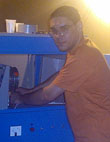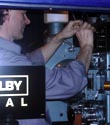|
|
 
|
|
Author
|
Topic: Switchs x Contactors x Relays
|
|
|
Randy Stankey
Film God

Posts: 6539
From: Erie, Pennsylvania
Registered: Jun 99
|
 posted 03-19-2003 06:07 PM
posted 03-19-2003 06:07 PM




I'm thinking "Contactor".
Essentialy, we're simply talking about a 3-Pole, Single Throw (SPST) relay that's specially built to withstand the kind of voltage, current and duty cycle that a load like that would produce. A relay is a lighter duty device and often can't withstand the constant duty cycle that a movie projector would need. Also, contactors are designed to minimize (or shield) arcing between the contacts when they engage or disengage. Simple relays may or may not be, depending on the type. You can also get solid state devices which work just like a mechanical contactor. Most people prefer mechanical devices, though.
Anyway, the contactor you would use would have 3 poles (or sets of terminals) to hook the projector's power lines through. There would be a fourth set of terminals through which you pass a voltage to energize the magnetic coil and pull the contacts shut, thus energizing the motor. Simple, really.
What I might suggest is putting a kill switch or an emergency stop into the system. Hooking up (or leaving a provision for) a failsafe would be a good idea too.
A simple way would be to hook the coil in series with the failsafe circuit and an on/off switch. Be careful that the failsafe can take the voltage you're putting through it and KEEP taking it for at least two hours.
Better, would be to use a 2P2T relay and set it up to "latch" itself into the closed position when the coil is energized. You would hook a N/O pushbutton switch up to the first set of contacts on the relay and through the coil. Pressing it would energize the coil and close the relay. Once it is closed, the other "throw" of that "pole" is used to keep it energized. In series with this is your failsafe circuit. The other set of contacts is simply used to energize the coil of the three phase contactor.
Pressing the pushbutton switch would attempt to close the relay but ONLY if the failsafe is closed/engaged. If it is, the relay sends voltage to the contactor which does its job and closes the circuit to the motor. If, at any time, the failsafe opens/disengages the relay "unlatches" and stops the motor.
Essentially, before we got our automation system this is what we did to run our projector. Ours uses a single-phase motor, though. One thing we did was use a 12 volt DC power supply to operate the Kill/Run/Start switches and the latching relay. That way we didn't have to worry about the 120 volt mains voltage overheating a contact, a switch or a wire and causing a meltdown mid-show.
You can get contactors that "latch" themselves shut if you like that idea. It's a bit less complicated but more expensive.
Your average 3-phase contactor will cost $20-$50 (U.S.) A latching contactor will cost more than that. ($50-$100??) Solid state relay/contactor will cost between $50 and $100. Parts, wires, switches and relays will cost you $20 or so, depending on how resourceful you are.
| IP: Logged
|
|
|
|
|
|
Luciano Brigite
Master Film Handler

Posts: 277
From: Sao Paulo, SP, Brazil
Registered: Jan 2002
|
 posted 03-19-2003 09:58 PM
posted 03-19-2003 09:58 PM




Thanks for your input Randy,
The wiring system is pretty simple, what is messing things up is the owner of the thing..he didn't even asked me for a parts list or anything and sent me a box full of switches and other stuff
he wants to be used in his projectors mostly because he thinks they looks nice.. ![[Roll Eyes]](rolleyes.gif) the switchs aren't crappy stuff but none of them are 3 pole and I'm thinking that using a contactor just to power a motor is somewhat a waste of part and $$ because it won't draw more than 3, maybe 4 Amp. then the idea of using a relay to power the motor came to mind instead of a contactor. Initial duty cycle for them will be about an hour on, one hour off ( initial setup is changeover but will change to single projector with tower later) then will change to a full show on,lets say 2 hours on, 15~20 minutes off .failsafes will come later with the tower as it's part of the tower system. Now I have a bunch of parts i'll have to find a way to use them just because the owner wants it there and is complaining that has spent a lot more than he thought on this .. the switchs aren't crappy stuff but none of them are 3 pole and I'm thinking that using a contactor just to power a motor is somewhat a waste of part and $$ because it won't draw more than 3, maybe 4 Amp. then the idea of using a relay to power the motor came to mind instead of a contactor. Initial duty cycle for them will be about an hour on, one hour off ( initial setup is changeover but will change to single projector with tower later) then will change to a full show on,lets say 2 hours on, 15~20 minutes off .failsafes will come later with the tower as it's part of the tower system. Now I have a bunch of parts i'll have to find a way to use them just because the owner wants it there and is complaining that has spent a lot more than he thought on this .. ![[Roll Eyes]](rolleyes.gif)
And.. don't think that a latching contactor is a good idea on a failsafe system too. don't want one sticking closed on me. already had a not so good experience with a common one sticking closed and not opening after the coil were powered off and it had to be the rectifier one, doing that on the last show, late at night ![[Mad]](mad.gif)
| IP: Logged
|
|
|
|
|
|
|
|
|
|
|
|
|
|
|
|
All times are Central (GMT -6:00)
|
|
Powered by Infopop Corporation
UBB.classicTM
6.3.1.2
The Film-Tech Forums are designed for various members related to the cinema industry to express their opinions, viewpoints and testimonials on various products, services and events based upon speculation, personal knowledge and factual information through use, therefore all views represented here allow no liability upon the publishers of this web site and the owners of said views assume no liability for any ill will resulting from these postings. The posts made here are for educational as well as entertainment purposes and as such anyone viewing this portion of the website must accept these views as statements of the author of that opinion
and agrees to release the authors from any and all liability.
|

 Home
Home
 Products
Products
 Store
Store
 Forum
Forum
 Warehouse
Warehouse
 Contact Us
Contact Us




 Printer-friendly view of this topic
Printer-friendly view of this topic





![[Mad]](mad.gif) switches ...it takes only a few minutes to install a round one.. it's just one hole.. but takes at least an hour to fit a square one in it's place .
switches ...it takes only a few minutes to install a round one.. it's just one hole.. but takes at least an hour to fit a square one in it's place .

![[Confused]](confused.gif)
![[Roll Eyes]](rolleyes.gif) the switchs aren't crappy stuff but none of them are 3 pole and I'm thinking that using a contactor just to power a motor is somewhat a waste of part and $$ because it won't draw more than 3, maybe 4 Amp. then the idea of using a relay to power the motor came to mind instead of a contactor. Initial duty cycle for them will be about an hour on, one hour off ( initial setup is changeover but will change to single projector with tower later) then will change to a full show on,lets say 2 hours on, 15~20 minutes off .failsafes will come later with the tower as it's part of the tower system. Now I have a bunch of parts i'll have to find a way to use them just because the owner wants it there and is complaining that has spent a lot more than he thought on this ..
the switchs aren't crappy stuff but none of them are 3 pole and I'm thinking that using a contactor just to power a motor is somewhat a waste of part and $$ because it won't draw more than 3, maybe 4 Amp. then the idea of using a relay to power the motor came to mind instead of a contactor. Initial duty cycle for them will be about an hour on, one hour off ( initial setup is changeover but will change to single projector with tower later) then will change to a full show on,lets say 2 hours on, 15~20 minutes off .failsafes will come later with the tower as it's part of the tower system. Now I have a bunch of parts i'll have to find a way to use them just because the owner wants it there and is complaining that has spent a lot more than he thought on this .. 
![[Embarrassed]](redface.gif) and this time it's not because any wire will make my hair rise in case I forget to open the breakers and touch any wire .. it makes things more complicated than they should be. I'll go on vacation after all this is done for sure
and this time it's not because any wire will make my hair rise in case I forget to open the breakers and touch any wire .. it makes things more complicated than they should be. I'll go on vacation after all this is done for sure ![[Cool]](cool.gif)
![[beer]](graemlins/beer.gif)




